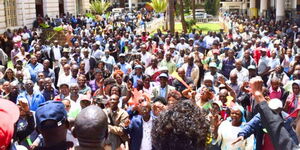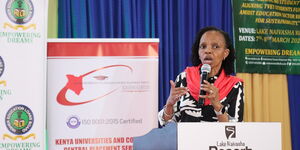The Judiciary in a statement on Sunday, April 26, came out to refute a news report by Standard carried on the daily's Sunday edition that claimed that a ruling of the Court of Appeal had given the government the go-ahead to tap and listen to private calls.
''The Standard got it wrong. Communication Authority (CA) engaged mobile network providers proposing to install a system to detect stolen phones and counterfeits.
''The court held that the stakeholder engagement should be completed and the rules subjected to public participation,'' the statement reads in part.
The news of the court ruling elicited mixed reactions with the President of the Law Society of Kenya and prominent lawyer Nelson Havi terming it as retrogressive.
''The ruling is retrogressive as it only comes a few years after the High Court quashed the security laws that were intended to the government oversight powers over the privacy of Kenyan citizens in the investigations and prosecutions of cases against terrorism,'' stated Havi.
The Standard had reported that the national government would be able to access phone records and listen to conversations whenever needed without having to obtain a court order.
The Judiciary stated that the ruling was in regard to the Communications Authority's proposal to install a system to detect stolen and counterfeit phones.
Following the apparent misinterpretation of the judgment by the media house, mixed reactions were raised with some Kenyans calling on the Judiciary to summarise judgments to avoid such scenarios.
''I suggest judiciary to start having press summaries for public interest judgments and rulings,'' said Duncan Ondimu.
This came after the court of appeal judges Martha Koome, William Ouko, and Daniel Musiga in a ruling allowed the Communications Authority Kenya to install a mass surveillance system.
The three-judge bench overturned Justice John Mativo's High Court ruling that outlawed the controversial data law that was meant to keep watch over mobile phone networks.
While quashing Justice Mativo's ruling, the three-judge bench faulted the lower court noting that it failed to observe that there was no credible evidence to demonstrate the system could not be used to spy and monitor Kenyans.
Havi termed the ruling as intended to be used to limit the freedom of Kenyans.
''But as it comes to occur there was no terrorism that the government was investigating to require such draconian laws, but if you look at the ruling it's just in line with what the government wanted, and what the Court of Appeal has is to undo many years of progressive gains towards balancing the rights of a private individual against the public interest,'' stated Havi.
Havi stated that LSK could appeal the ruling at the Supreme Court after consultations with its members.
''The court didn't use logic in the ruling and it''s a ridiculous one. We shall consult our members and if they are of the view that we take legal action then we shall move at the Supreme Court to challenge it," he added.
Havi called out legislators who he said forgot their representation obligations, taking a swipe at Homa Bay Town MP Opondo Kaluma who publicly supported the ruling on his Twitter account while drawing comparisons with the United States of America.
''There are these MPs who have a legal foundation as advocates but when they get into Parliament they forget they are advocates. There are many times when these Members of Parliament come to courts to challenge certain laws and the judge asks them where they were when the laws were being made.
''We are in an environment where legislators are in bed with the Executive and the courts are weakened and they just rubberstamp the actions of the Legislature and the Executive, so who will speak and stand for Kenyans?" Havi wondered.












